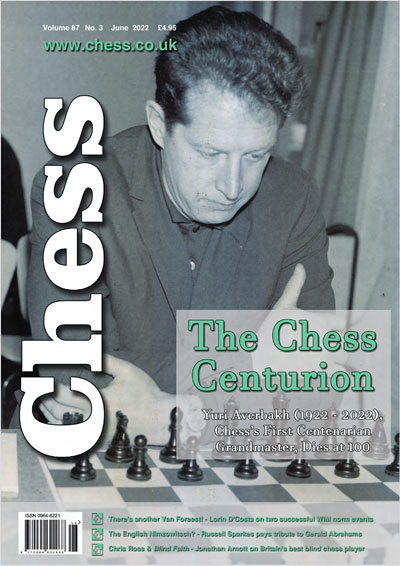Russian composer Oleg Pervakov, one of the best study composers currently active, published his first study in 1977, and, between then and now, has produced over 250. In 1995, with the help of Dutch study enthusiast Jan van Reek, he published 64 Majestic Studies, a very short book of just 36 pages, and the title is not hyperbole. The book is divided into five sections: Matter, Time, Space, Systematic Manoeuvres and Ultra-Modern Studies. Here from the first section is one of Oleg’s earliest successes.
As Oleg writes, here a logical manoeuvre leads to domination, a very popular study theme.
In the above diagrams you can move the pieces to analyse, and in fact switch on an engine (fan icon below the board) for analysis assistance. That will provide answers to all "What if..." and "Why not..." questions that might arise.
So what we are suggesting is that you solve the studies yourself, with or without engine help. At the bottom of this page you will find all the solutions, fully annotated.
Christopher Jones started composing chess problems in 1987. He began with directmates, but soon discovered his true passion, which is helpmates. He was awarded his Grandmaster title in 2012. He has been sub-editor of the helpmates section of The Problemist since 1997, has been the secretary of the British Chess Problem Society since 2002, and is currently its President. His recently-published book is Selected Helpmates 1989-2021.
Christopher writes engagingly about his helpmates and about himself. His book has nine chapters, the last titled ‘Scraping the Barrel’, which should give you an idea of his writing style, which is always enjoyable. He does not hold back from criticising himself on occasion. This is a tidily-produced paperback containing many helpmates, with the solutions set apart from the diagrams, for the convenience of solvers. The book can be acquired direct from the publisher at nightrider-unlimited.de, and is warmly recommended.
Here, not from that last chapter, is a helpmate for you to solve. In a helpmate, Black plays first and plays to help White mate Black on, in this case, White’s third move. The move sequence is: 1 BW 2 BW 3 BW#. Chapeau to you if you succeed!
To enter email editor@chess.co.uk or send your name and address, with the main variations, to Chess & Bridge, 44 Baker Street, London W1U 7RT, postmarked no later than June 30th. £30 of products from Chess & Bridge are available for the first correct entry drawn.
Solutions
And here are the solutions to the two studies above. Note that you can click on the moves of the notation to get a replay on the side, where you can follow the lines given. Below this board, once again, you have a fan icon to obtain engine assistance. There are also buttons for more lines, for the threat ("!") that the last move poses, download, etc.
The above feature is reproduced from Chess Magazine June/2022, with kind permission.

CHESS Magazine was established in 1935 by B.H. Wood who ran it for over fifty years. It is published each month by the London Chess Centre and is edited by IM Richard Palliser and Matt Read.
The Executive Editor is Malcolm Pein, who is also the Chief Executive of Chess in Schools and Communities (CSC), a UK charity which teaches chess in schools, prisons and libraries. In conjunction with CSC, Malcolm organises the world-class tournament and chess festival, the London Chess Classic.
They are currently preparing to stage ChessFest in Trafalgar Square on Sunday 17th July.
CHESS is mailed to subscribers in over 50 countries. You can subscribe from Europe and Asia at a specially discounted rate for first timers, or subscribe from North America.
.jpeg)























